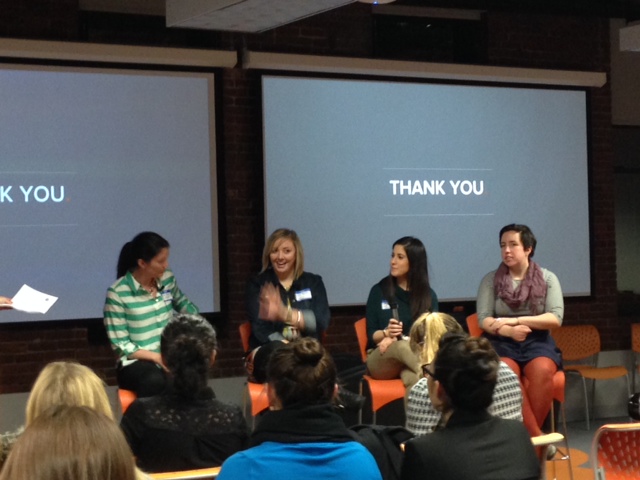Three Ways to Use Mentors
-
January 28, 2014
- Posted by: Chaloner

Did you know that January is National Mentoring Month (#mentoringworks)? Last week, our guest blogger, Samantha Beach shared her take-aways from an event in NYC. This week we explore how a mentor can help you get to where you want to go.
Seek out mentors whose careers you want to emulate.

This past week we attended the Young Women in Digital (#YWDBoston) event “PR in the Digital World 2014.” A panel of accomplished speakers featured Katie Burke of Hubspot, Elizabeth Good of the Rose F Kennedy Greenway, Marissa Green of Cone Communications, and Katie Martell of Aberdeen Group. The topics ranged from social media stunts to how to capture a journalist’s attention. Yet perhaps the most valuable advice offered to an audience of hungry up-and-coming females was this: identify others with careers you’d like to emulate and learn from them to help you pave your own road. Who is doing the kind of work right now that you’d like to do someday? Or who has a type of platform that you dream of having? Those individuals once stood where you now stand. The story of their career is more complex than their current title, and they can provide valuable insight into what steps might get you to precisely where you want to go.
Career advice.
Indeed, we often seek mentors as a resource for professional guidance. But be sure to think broadly about the kinds of counsel a mentor can provide. A mentor is well suited to advise you on the big picture of your career. With his/her breadth of experience, a mentor can help identify when it might be time for you to make a move and to what kind of opportunity. The mentor can help discern which career moves are within your reach yet just outside of your comfort zone. But mentors can also be a great sounding board for challenges you face in your current role. Chances are your mentor has experience initiating difficult conversations, breaking out of tired routines or dealing with whatever your immediate issue might be. A mentor can really help with the basics of your job but use them wisely. Don’t expect them to consult on every email you write!
Making connections.
The U.S. Bureau of Labor Statistics claims that 70% of all jobs are found through networking. In their 2013 Source of Hire Report, CareerXRoads estimates that a candidate who has acquired a referral is 3-4 times more likely to be hired. Once they have gotten to know and trust you and your work, a mentor can introduce you to their network. A mentor can get you into a room you might not have had access to on your own, and perhaps most significantly, a mentor can then speak on your behalf. He/she can be your strongest advocate in important circles of influence.
These are just a few of the ways to utilize this valuable relationship. Over time, a mentor will serve you in creative and unforeseeable ways as well. This January, if you have a mentor, consider how you might better use him/her. And if you don’t have a mentor, get started on finding one. Who knows where it might lead?
Chaloner, founded in 1979 as Chaloner Associates, is a national executive search firm that focuses on recruiting mid- to senior-level communications, public relations, marketing and investor relations professionals.
